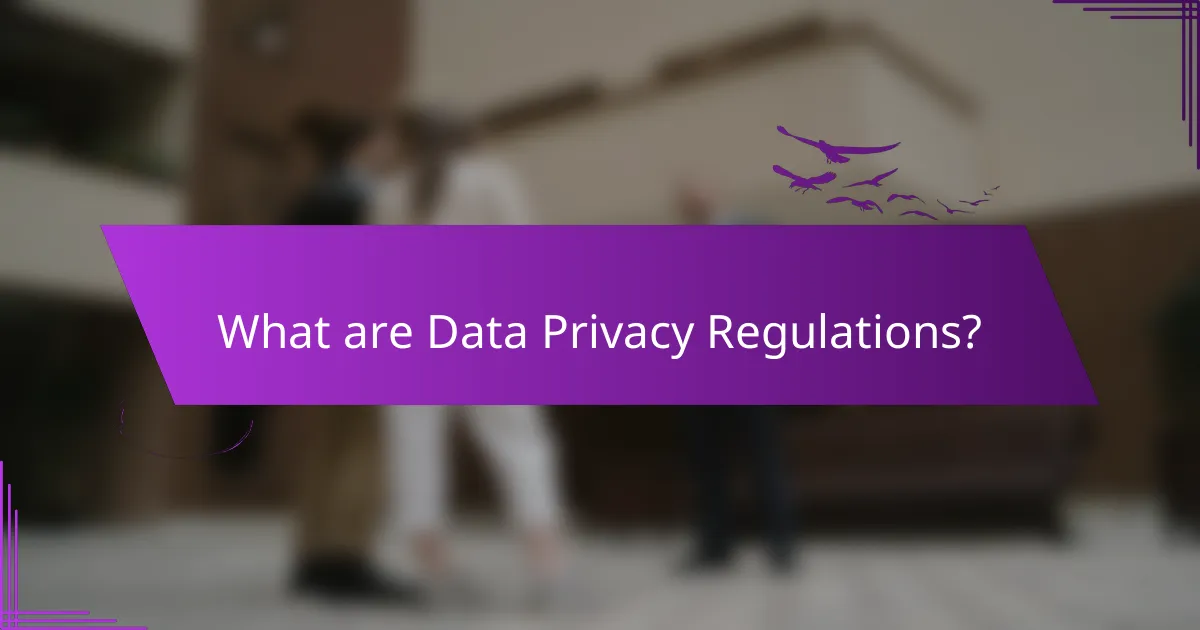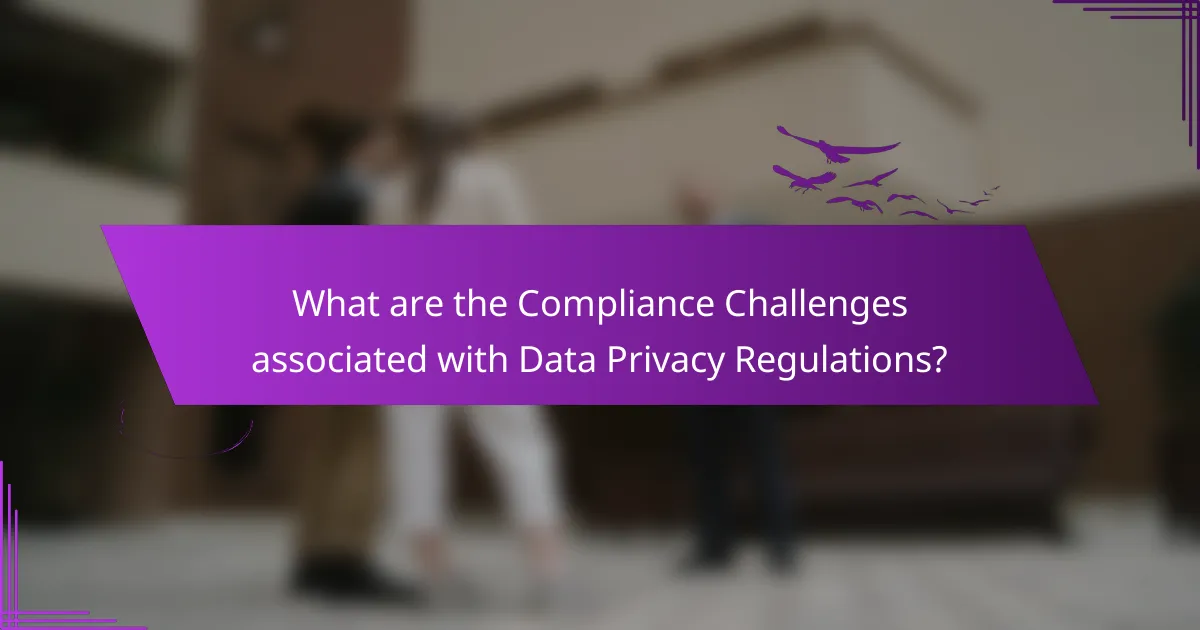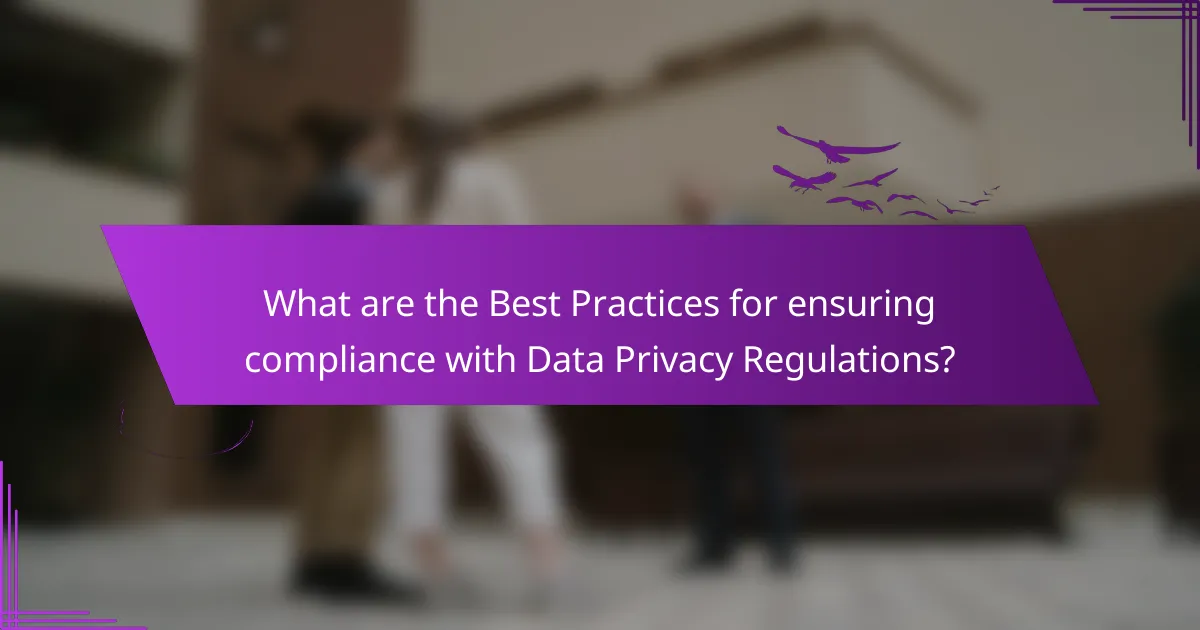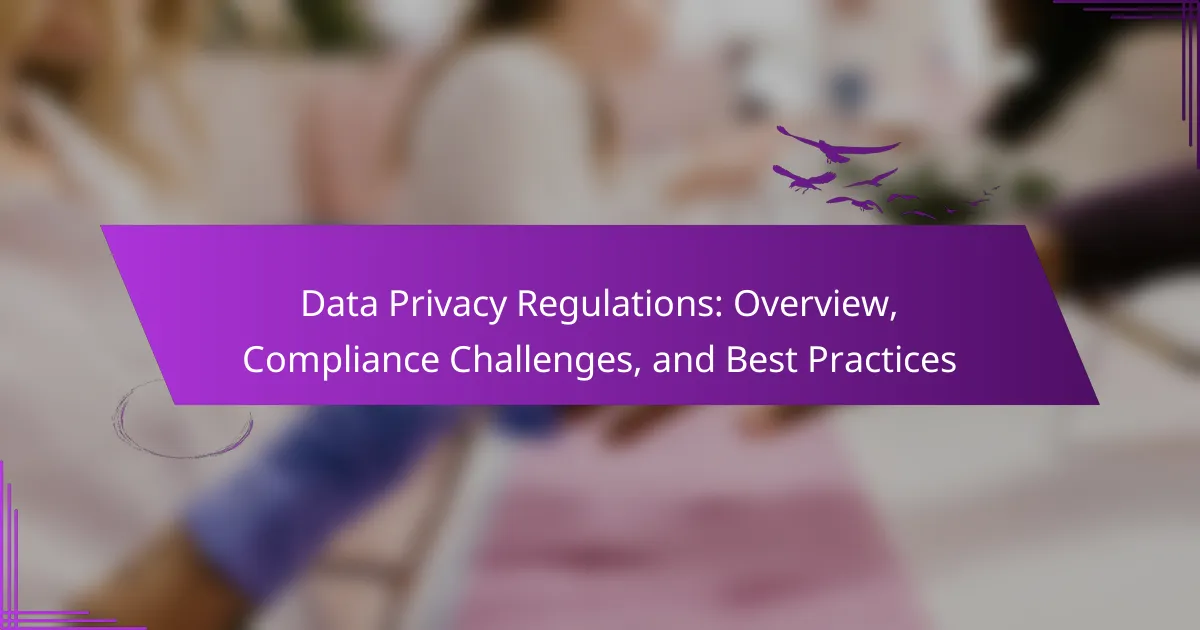
What are Data Privacy Regulations?
Data privacy regulations are legal frameworks that govern the collection, use, and protection of personal data. They aim to safeguard individuals’ privacy rights and establish accountability for organizations handling such data. Notable examples include the General Data Protection Regulation (GDPR) in the European Union and the California Consumer Privacy Act (CCPA) in the United States. These regulations require organizations to obtain consent from individuals before processing their data. They also mandate transparency in data handling practices and the implementation of security measures to protect personal information. Compliance with these regulations is essential for organizations to avoid legal penalties and build trust with consumers.
Why are Data Privacy Regulations important?
Data privacy regulations are important because they protect individuals’ personal information. These regulations establish guidelines for how organizations collect, store, and use data. They help prevent data breaches and unauthorized access, which can lead to identity theft. Compliance with these regulations builds trust between consumers and businesses. For example, the General Data Protection Regulation (GDPR) in Europe imposes strict rules on data handling. Organizations that fail to comply can face significant fines, reaching up to 4% of annual global revenue. Thus, data privacy regulations are crucial for safeguarding privacy and ensuring accountability in data management.
What impact do Data Privacy Regulations have on consumers?
Data privacy regulations significantly impact consumers by enhancing their control over personal information. These regulations require organizations to obtain explicit consent before collecting data. Consumers gain the right to access, correct, or delete their data. Regulations also mandate transparent data practices, informing consumers how their data will be used. For example, the General Data Protection Regulation (GDPR) enforces strict guidelines across the EU. Studies show that 89% of consumers are more likely to engage with companies that prioritize data privacy. This increased transparency fosters trust between consumers and businesses. Ultimately, data privacy regulations empower consumers and promote responsible data handling.
How do Data Privacy Regulations affect businesses?
Data privacy regulations affect businesses by imposing strict compliance requirements. These regulations require businesses to protect customer data and maintain transparency. Non-compliance can lead to significant fines. For example, the General Data Protection Regulation (GDPR) can impose fines up to 4% of annual global revenue. Businesses must also invest in data protection measures and employee training. This can increase operational costs. Additionally, regulations can impact marketing strategies by limiting data usage. Overall, businesses must adapt to these regulations to avoid legal repercussions and build customer trust.
What are the key components of Data Privacy Regulations?
The key components of Data Privacy Regulations include consent, data subject rights, data protection measures, and accountability. Consent requires organizations to obtain explicit permission from individuals before collecting or processing their personal data. Data subject rights grant individuals the ability to access, rectify, and erase their personal information. Data protection measures involve implementing security protocols to safeguard personal data from unauthorized access and breaches. Accountability mandates organizations to demonstrate compliance with regulations through documentation and reporting. These components ensure that personal data is handled responsibly and transparently, aligning with legal standards like the GDPR and CCPA.
What types of data are covered by Data Privacy Regulations?
Data privacy regulations cover various types of personal data. This includes identifiable information such as names, addresses, and phone numbers. Sensitive data categories include health information, financial records, and biometric data. Regulations also protect data related to race, ethnicity, and [censured] orientation. Additionally, data concerning children is subject to stricter regulations. These protections are enforced to ensure individual privacy rights are upheld. Compliance with these regulations is essential for organizations handling personal data.
What rights do individuals have under Data Privacy Regulations?
Individuals have specific rights under Data Privacy Regulations. These rights typically include the right to access their personal data. Individuals can request information about how their data is processed. They also have the right to rectify inaccurate data. This ensures that their information is kept up to date.
Additionally, individuals can request the deletion of their personal data. This is often referred to as the right to be forgotten. They have the right to restrict processing under certain conditions. Individuals can also object to the processing of their data for direct marketing.
Furthermore, individuals have the right to data portability. This allows them to transfer their data between service providers. These rights are supported by regulations such as the General Data Protection Regulation (GDPR) in the European Union. Compliance with these rights is essential for organizations handling personal data.

What are the Compliance Challenges associated with Data Privacy Regulations?
Compliance challenges associated with data privacy regulations include understanding complex legal requirements. Organizations must navigate various regulations like GDPR and CCPA. Each regulation has unique obligations regarding data collection and processing. Compliance requires significant resources for training staff and implementing policies. Many organizations face difficulties in maintaining accurate records of data processing activities. Additionally, ensuring third-party compliance adds another layer of complexity. Frequent changes in regulations can lead to confusion and non-compliance risks. Organizations also struggle with the technical aspects of data protection measures. Finally, the potential for substantial fines underscores the importance of effective compliance strategies.
What are the common obstacles businesses face in compliance?
Businesses face several common obstacles in compliance with data privacy regulations. One major challenge is the complexity of regulations. Different jurisdictions have varying requirements, making compliance difficult. Additionally, businesses often struggle with resource constraints. Limited budgets and personnel can hinder compliance efforts.
Another obstacle is the lack of awareness and training among employees. Many employees may not fully understand data privacy regulations. This can lead to unintentional non-compliance. Furthermore, maintaining up-to-date technology is a challenge. Outdated systems may not support necessary compliance measures.
Finally, managing data breaches poses significant difficulties. Responding to breaches while ensuring compliance can overwhelm businesses. These obstacles collectively complicate adherence to data privacy regulations.
How do varying regulations across regions complicate compliance?
Varying regulations across regions complicate compliance by creating a patchwork of legal requirements. Organizations must navigate different laws that may conflict with one another. For example, the General Data Protection Regulation (GDPR) in Europe has strict data privacy rules. In contrast, the California Consumer Privacy Act (CCPA) has its own set of regulations that may differ significantly. This inconsistency can lead to confusion and increased operational costs. Companies may need to implement multiple compliance strategies to meet diverse regional demands. Furthermore, failure to comply with any of these regulations can result in significant penalties. Thus, the complexity of managing compliance increases with each additional jurisdiction involved.
What role does technology play in compliance challenges?
Technology plays a critical role in compliance challenges by providing tools for monitoring and managing regulatory requirements. It enables organizations to automate compliance processes, reducing human error and improving efficiency. Technologies such as data encryption and access controls help safeguard sensitive information. Additionally, compliance management software assists in tracking regulatory changes and ensuring adherence to data privacy laws. According to a 2021 report by Deloitte, 57% of organizations use technology to enhance their compliance capabilities. This demonstrates that leveraging technology is essential for navigating the complexities of compliance in data privacy regulations.
What are the consequences of non-compliance with Data Privacy Regulations?
Non-compliance with data privacy regulations can lead to significant legal and financial consequences. Organizations may face hefty fines, often reaching millions of dollars. For instance, the General Data Protection Regulation (GDPR) imposes fines up to €20 million or 4% of annual global turnover, whichever is higher. Additionally, non-compliance can result in legal actions from affected individuals or regulatory bodies. Businesses may also encounter reputational damage, leading to loss of customer trust and market share. In some cases, organizations might be required to implement costly remedial measures to address compliance failures. Overall, the repercussions of non-compliance can severely impact an organization’s financial health and operational viability.
What fines and penalties can businesses incur?
Businesses can incur fines and penalties for non-compliance with data privacy regulations. These fines vary based on the regulation and the severity of the violation. For instance, under the General Data Protection Regulation (GDPR), fines can reach up to €20 million or 4% of annual global turnover, whichever is higher. The California Consumer Privacy Act (CCPA) imposes fines of up to $7,500 per violation. Additionally, businesses may face civil penalties, legal fees, and reputational damage. Regulatory bodies enforce these penalties to ensure compliance and protect consumer data.
How can non-compliance damage a business’s reputation?
Non-compliance can severely damage a business’s reputation. It can lead to loss of customer trust. Customers expect businesses to protect their personal data. When a company fails to comply with data privacy regulations, it risks exposing sensitive information. This exposure can result in data breaches. Data breaches often lead to negative media coverage. Negative media coverage can tarnish a brand’s image. According to a 2021 study by IBM, the average cost of a data breach is $4.24 million. This financial impact can further damage a company’s reputation.

What are the Best Practices for ensuring compliance with Data Privacy Regulations?
Implementing best practices for data privacy compliance involves several key actions. Organizations should conduct regular data audits. This helps identify what data is collected and how it is used. Training employees on data privacy regulations is essential. This ensures they understand their responsibilities regarding data handling.
Establishing clear data governance policies is crucial. These policies should outline data access, usage, and sharing protocols. Utilizing encryption for sensitive data protects it from unauthorized access. Regularly updating software and security measures helps mitigate vulnerabilities.
Documenting compliance efforts is necessary for accountability. This documentation can be vital during audits or regulatory reviews. Engaging with legal experts on data privacy laws ensures adherence to evolving regulations. Lastly, maintaining transparency with customers about data practices builds trust and compliance.
How can organizations effectively implement Data Privacy policies?
Organizations can effectively implement Data Privacy policies by conducting a thorough assessment of their data handling practices. This assessment identifies what data is collected, how it is processed, and who has access to it. Organizations should then establish clear data privacy policies that comply with relevant regulations like GDPR or CCPA. Training employees on these policies is crucial to ensure compliance at all levels. Regular audits and assessments should be conducted to monitor adherence to the policies. Organizations should also implement robust data security measures to protect sensitive information. Engaging with legal experts can help in navigating complex regulatory requirements. By fostering a culture of privacy, organizations can enhance trust with customers and stakeholders.
What steps should be taken to assess current data practices?
Identify existing data sources and their purposes. This involves cataloging all data types collected. Evaluate data collection methods for compliance with regulations. Review data storage practices to ensure security and accessibility. Analyze data sharing protocols with third parties. Assess data retention policies to align with legal requirements. Conduct regular audits to identify gaps in practices. Engage stakeholders for feedback on data handling processes.
How can employee training enhance compliance efforts?
Employee training enhances compliance efforts by equipping staff with essential knowledge of regulations. It ensures employees understand their roles in maintaining data privacy. Training programs can clarify specific compliance requirements and procedures. Regular training updates help employees stay informed about changes in regulations. This proactive approach mitigates risks associated with non-compliance. According to a report by the Ponemon Institute, organizations with regular training experience 50% fewer data breaches. Effective training fosters a culture of accountability and vigilance among employees. This ultimately strengthens an organization’s overall compliance posture.
What tools and technologies are available to support compliance?
Compliance tools and technologies include software solutions like GRC (Governance, Risk Management, and Compliance) platforms, data encryption tools, and identity management systems. GRC platforms streamline compliance processes by integrating risk management and regulatory requirements. Data encryption tools protect sensitive information, ensuring it remains confidential and secure. Identity management systems regulate user access and authentication, reducing unauthorized data access. These technologies help organizations adhere to data privacy regulations effectively. For instance, a study by the International Association of Privacy Professionals indicates that organizations using GRC tools see a 30% reduction in compliance-related incidents.
How can data encryption help in compliance with regulations?
Data encryption aids in compliance with regulations by protecting sensitive information. It ensures that data is unreadable to unauthorized users. This is crucial for regulations like GDPR and HIPAA, which mandate data protection. Encryption helps organizations demonstrate accountability and due diligence in safeguarding personal data. Additionally, encrypted data breaches may not require notification if the information is rendered unusable. This can significantly reduce legal and financial repercussions. Therefore, implementing data encryption is a vital strategy for meeting regulatory requirements and protecting consumer trust.
What role do data management platforms play in ensuring compliance?
Data management platforms play a crucial role in ensuring compliance with data privacy regulations. They facilitate the collection, storage, and processing of data in a manner that adheres to legal requirements. These platforms help organizations implement data governance policies. This includes data access controls and audit trails. Such features ensure that only authorized personnel can access sensitive information. Additionally, data management platforms often include tools for data anonymization and encryption. This protects personal data from unauthorized access and breaches. By maintaining accurate records of data processing activities, these platforms support accountability. Compliance with regulations like GDPR and CCPA is thus more achievable. Organizations using these platforms can demonstrate their commitment to data protection and privacy.
What are the best strategies for staying updated on Data Privacy Regulations?
The best strategies for staying updated on Data Privacy Regulations include subscribing to reputable legal and compliance newsletters. These newsletters often provide timely updates on changes in regulations. Following industry leaders and organizations on social media can also be beneficial. They frequently share insights and developments in data privacy laws. Attending webinars and conferences related to data privacy can enhance understanding and provide networking opportunities. Participating in professional associations focused on data protection keeps members informed about best practices. Engaging with legal experts through forums or discussion groups can clarify complex issues. Regularly reviewing government websites and official publications ensures access to the most accurate information.
How can organizations create a culture of data privacy awareness?
Organizations can create a culture of data privacy awareness by implementing comprehensive training programs. These programs should educate employees on data privacy laws and best practices. Regular workshops and seminars can reinforce this knowledge. Establishing clear data handling policies is essential. These policies should be accessible and easy to understand. Encouraging open discussions about data privacy can foster a supportive environment. Organizations should also lead by example, demonstrating commitment to data privacy through actions. Regular assessments and audits can help identify areas for improvement. According to a study by the International Association of Privacy Professionals, organizations with strong privacy cultures experience fewer data breaches.
What resources are available for ongoing education in data privacy?
Online courses from platforms like Coursera and Udemy offer ongoing education in data privacy. These courses cover various aspects of data protection laws and best practices. Professional organizations such as the International Association of Privacy Professionals (IAPP) provide certifications and training resources. Webinars and workshops hosted by industry experts also serve as valuable educational tools. Additionally, government websites often publish guidelines and resources related to data privacy compliance. Academic institutions frequently offer specialized programs focused on data privacy and cybersecurity. These resources ensure that individuals stay updated on evolving data privacy regulations and practices.
Data Privacy Regulations are legal frameworks that govern the collection, use, and protection of personal data, aimed at safeguarding individuals’ privacy rights. This article provides an overview of the significance of these regulations, highlighting key components such as consent, data subject rights, and accountability. It addresses compliance challenges faced by organizations, including varying regional regulations and the need for effective technology solutions. Furthermore, the article outlines best practices for ensuring compliance, including employee training and the use of data management platforms, while emphasizing the importance of maintaining consumer trust in an increasingly data-driven world.
